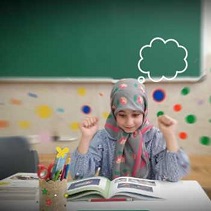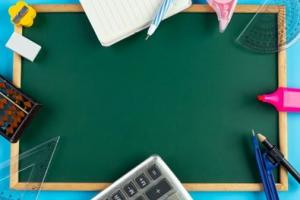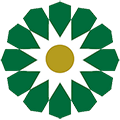Novid Ayandeh International School (MABNA)
Novid Ayandeh International School (Mabna) is a joint activity of the Tazkieh Cultural and Educational Institute in Iran and the Islamic Centre of England. The Tazkieh Cultural and Educational Institute, with tens of years of experience and brilliant activity, has the honour of educating tens of thousands of Iranian students from pre-school to pre-university. This institute is located in the Sa'adat Abada district of Tehran. It is one of the best educational institutes in Iran with hundreds of experienced teachers, trainers, and consultants, which has left a good record in the field of education and training students. The Islamic Centre of England, with more than 22 years of experience, is one of the active and well-known centres in the field of religious education of Muslims in the West and offers a variety of activities in various fields in person and virtual to those interested. "MABNA" is a virtual school that offers a variety of education for elementary students - from first to sixth grade-. These trainings are organized and planned at three different levels and can be used by all those interested in Persian language, Iranian culture, and Islam worldwide.

MABNA helps your child
- Learn their native language (Persian) well.
- Get acquainted with the Islamic knowledge and Iranian cultural in accordance with the requirements of the World.
- Simultaneously with the Iranian educational calendar, he can also learn Iranian education courses at his place of residence.
Benefits of Persian Virtual School
- Temporal and locative flexibility
- Without conflict with your child’s current education in the country of residence
- Certificate for the end of course / any subject
- Ability to select whole basic courses / a set of courses / single course
- Proportional tuition
- New teaching methods and evaluation using modern technologies

Levels of Schooling
School education is presented to the audience in three parts:
According to the education curriculum
- The content of the courses of each level is uploaded through LMS on Fridays
- Holding online classes with school teachers on Saturdays and Sundays
- Evaluations will be done continuously
- Learning activity report will be sent to families every six weeks.

Learning Persian literature and social and Islamic sciences
- Uploading the educational content of Persian courses and Islamic and Quranic studies and gifts in LMS
- Holding online classes on Fridays, Saturdays and Sundays
- Improving the level of students’ learning in the mentioned topics
School Curriculum
Curriculum planning includes organizing a series of teaching and learning activities to make desirable changes in learners’ behaviour and evaluate the extent to which these changes are realized.
Learning based on selected topics by beginners
- Receiving the course content by the student on Fridays in accordance with the registered course and the opportunity of one week to ten days to complete the course activity
- Track student learning by instructor during the week via Skype or WhatsApp
- Requiring student participation in online classes
MABNA Teaching Method
Teaching method is a set of regular measures that the teacher adopts to guide the activities in order to achieve the educational goals according to the conditions and facilities.
Direct transfer based teaching methods
Memory method: Creating the skill of receiving information correctly and storing it in memory by learners, in order to retrieve and use information in various academic activities. The purpose of this teaching method is to strengthen and keep memory active for communication and thinking. Academic demonstration method (practical skills training): The basis of this method is to observe, practice and use real objects in the educational environment. Learners in this method learn specific skills based on seeing, hearing and practicing individually and collectively.
Subject- Focused teaching methods
- Laboratory method: The basis of this method is based on the principles of exploratory learning. This means that nothing is taught directly, but conditions are provided for learners to do research through experiment and discover the answer to the problem.
- Exploratory method: An experimental method is an approach through which learners are encouraged to interact with their environment, that is, to explore, manipulate objects and think about the relationships between phenomena.
- Project-focused Method: The project usually starts with questions, issues or challenges and allows learners to learn. They also combine their curriculum with research methods and go through the research process, rethink, and prepare for the presentation. In fact, in one session, the role of the teacher is performed in the student area.
Direct transfer based teaching methods
- Memory method: Creating the skill of receiving information correctly and storing it in memory by learners, in order to retrieve and use information in various academic activities. The purpose of this teaching method is to strengthen and keep memory active for communication and thinking.
- Academic demonstration method (practical skills training): The basis of this method is to observe, practice and use real objects in the educational environment. Learners in this method learn specific skills based on seeing, hearing and practicing individually and collectively.
Interaction-based teaching methods
- Question-and-answer method: The teacher forces the learners to make a subjective effort by asking questions that arouse the curiosity of the learners. The instructor also helps to consciously discover the problem by guiding the learners’ subjective effort so that the result leads to creativity and knowledge acquisition. The purpose of the question and answer method is to recognize and stimulate thinking, strengthen the power of reasoning, use experiences and build confidence in learners.
- Role-playing method: The teacher uses this method according to the situation, purpose and subject of the lesson. People who participate in the role-playing method include; Teacher or administrator, learners and observers. In fact, the classroom environment becomes a stage.
- Group discussion method: The focus of the group discussion method is discussion and debate. The educator introduces resources for their learners to study and gather information. In this method, learners’ interest and mastery of the content is very important, as a result of which the ability to comment in public is created in the learner. Other goals of this method are to strengthen the power of expression, reasoning, analysis and decision making.
- Collaborative learning method (Collaborative): Collaborative teaching method provides an opportunity for learners to experience teamwork, responsibility, social and interaction skills. In fact, they study a common theme in a group and deepen their learning, then share their information in groups, which leads to understanding, comprehension and analysis of the themes. At the end, they review the themes, which is the highest level of learning.
Subject- Focused teaching methods
- Laboratory method: The basis of this method is based on the principles of exploratory learning. This means that nothing is taught directly, but conditions are provided for learners to do research through experiment and discover the answer to the problem.
- Exploratory method: Exploratory method is an approach through which learners are encouraged to interact with their environment, that is, to explore, manipulate objects and think about the relationships between phenomena.
- Project-focused Method: The project usually starts with questions, issues or challenges and gives learners the opportunity to learn. They also combine their curriculum with research methods and go through the research process, rethink, and prepare for presentation. In fact, in one session, the role of the teacher is performed in the student area.
Individual training methods
- Individual training prescribed: The learner is obliged to work individually on the sections assigned to him. When a section is finished, he must answer the test attached to that section, and if the result of his performance in the test is satisfactory, he will be directed to the next section to continue the activities.
- Individual computer-based training: Face-to-face training takes place, then online learning is achieved in the context of cyberspace, and in online classes, discussion and interaction between the teacher and the learner is created.
Content of Elementary School Textbooks
First grade
- Quran: Listening to Quranic verses, telling Quranic stories, memorizing some verses and short chapters, entertainment and Quranic games
- Persian literature: drawings, teaching signs 1, teaching signs 2
- Science: Science class, Hello look at me, be healthy, be happy, animal world, plant world, earth-our watery home, earth-our stone home, what do we want to build
Second grade
- Quran: Teaching the rules (A small / stillness / intensification / Tanwin), recalling surahs with short verses, Surah Ma’un, Surah Kaferun, Surah Al-Qadr, Surah Al-Ansharah, Surah An-Nasr, telling Quranic stories according to the mentioned surahs, Quran in Summer (Masad / Quraysh / Hamzeh / Shams / Bayenah / Qareah)
- Mathematics: numbers and digits, addition and subtraction of two-digit numbers, geometric shapes, three-digit numbers, measurement, addition and subtraction of three-digit numbers, fractions and probabilities, statistics and graphs
- Science: Science class, healthy air, healthy water, our life and the earth’s rotation 1, our life and the earth’s rotation 2, find the code message 1, find the code message 2, if it ends, build and enjoy, history and enjoy, history Seed, inside the nests, I grow, we prepare for the celebration, after the celebration, from the past to the future
- Persian Literature: Institutions, Health, Individual-Social Ethics, Way of Life, Art and Literature, My Iran, Nature
- Heavenly Gifts: Theology, Prophethood, Imamate, Quranic Messages, Literature and Ethics, Rulings, Islamic Ceremony, Self-Knowledge
Third grade
- Quran: teaching prayer, teaching reciting the Quran, familiarity with the Quran, Surah Adiyat and Qareh, Ayah al-Kursi, Surah al-Isra, Surah Al-Imran, Surah Ibrahim, Surah Al-Ma’ida, Surah Taha, Surah Al-Shu’ara, Surah Al-Baqarah (Surah Al-Baqarah)
- Persian Literature: Institutions, Health, Individual-Social Ethics, Way of Life, Art and Literature, My Iran, Nature
- Mathematics: Patterns, four-digit numbers, fractional numbers, multiplication and division, environment and area, addition and subtraction, statistics and probability, multiplication of numbers
- Science: Science Bell, Foods, Materials Around Me, Measuring Materials, Water, Valuable Material, Our Life and Water, Light and Observation of Objects, Search and Build, Power Everywhere 1, Power Everywhere 2, Plant And see, each one his place 1, each his place 2, from the past to the future
- Heavenly gifts: thanksgiving to God, the manners of the Prophet and the Imams, monotheism, the event of Ashura, sacrifice, respect for parents, the rules of prayer, fasting and Eid al-Fitr, the concept of servant of God (puberty celebration), proper cover, organised in work, actions reward
Fifth grade
- Quran: Remembrance of prayer in Quran, Surah Ma’idah, Surah An’am, Surah An-Nisa, Surah Abbas, Surah An-Nahl, Surah Al-Shu’ara, Surah Anbiya, Surah Anfal, Surah Ibrahim, Surah Ra’d, Quran in summer (Surah Yusuf)
- Persian Literature: Creation, Knowledge and Awareness, My Iran, Names, Way of Life, Science and Practice
- Mathematics: Numerology, Fraction, Ratio and Proportion and Percentage, Symmetry and Polygons, Decimal Numbers, Measurement, Statistics and Probability
- Science: The bell of science, matter changes, the rainbow, the rapture of the history of the earth, the movement of the body, what news 1, what news 2, things become easy 1, things become easy 2, valuable soil, plant and eat, From root to leaf
- Heavenly Gifts: Holy Quran, Theology, Prophethood, Imamate, Islamic customs and ethics, rules, Islamic ceremonies, the Hereafter, religious figures
Sixth Grade
- Persian Literature: Knowledge of the Creator, Wise and Intellect, Homeland, Heros, Way of Life, Science and Practice
- Social Studies: Friend and Friendship, Decision Making, Agriculture, Energy Resources, Science and Technology in the Islamic Period, Isfahan, Leisure, Clothing, Seas, Iran’s Neighbours, Resistance, Freedom of Khorramshahr
- Heavenly Gifts: Knowledge and Theology, Acceptance of Wilayah, Mahdism, Anti-Enmity, Resurrection, life Etiquette, Ethics and Discipline, Health (Sports), Ways to Success, Rulings
Fourth grade
- Quran: Reminder of past rules, Surah Taghabun, Surah Ibrahim, Surah Al-Waqi’ah, Surah Al-Imran, Surah Al-Baqarah, Surah Hood, Surah Al-Mulk, Surah An-Naml, Surah Yusuf, Surah Al-Isra, Surah Abbas
- Persian Literature: Creation, Knowledge and Awareness, My Iran, Indigenous Culture, Heros, Way of Life, Science and Practice
- Mathematics: Numbers and Patterns, Fraction, Multiplication and Division, Measurement, Mixed Number and Decimal Number, Geometric Shapes, Statistics and Probability
- Science: our body 1 and 2, mixture, rocks, invertebrates, plants, habitat, energy, electricity, magnets, heat, sky, science class
- Heavenly Gifts: Holy Quran, Theology, Prophethood, Imamate, Islamic etiquettes and ethics, rules, Islamic ceremonies, the Hereafter, religious figures
Assessment
Today, with the introduction of technology into the field of education, many techniques, including assessment methods, have undergone changes. One of these assessment methods is alternative methods in virtual training.
Types of alternative assessment methods in virtual training
Alternative individual / theoretical evaluations
- Controlled Oral Testing Technique: A live oral presentation performed by learners. In this way, the instructor asks all students to be active on the platform at a specific time and date. The teacher then asks his questions orally.
- Asynchronous presentation technique (recorded): Presentation of video or audio recording of answering questions by learners. In this way, topics and questions are identified in advance.
- Short-answer question technique: In such questions, learners’ answers are completely predetermined. In fact, the instructor prepares questions in advance with short answers and, by asking questions, evaluates the learners on the basis of grading.
- Response test technique: This method is very common. A number of questions are given to the learners, after which they are asked to choose a number of questions to answer based on their own interests and knowledge and to answer them within a certain period of time.
- Infographic technique: Infographics are a combination of graphics and information that are characterized by movement and dynamism in the presentation of content.
- Interactive video technique: Learners can use interactive videos to present their assignments. The topic of the interactive videos is chosen by the tutor and shared with other learners.
- Flashcard technique: A combination of graphics and a short text
- Techniques of educational games: They are learning contents that are provided by the teacher to the learners, in fact, they are the same answers provided by the learners to the teacher that are only played and time is given to the contents.
- Questioning technique: In this method, the teacher asks the learners to ask questions instead of answering the teacher’s own questions. “Socrates” used questioning in teaching and evaluating his students.
Alternative individual / experimental evaluations
- Case Study Technique: The instructor provides the learners with a written case and asks them to think about it and give their opinions.
- Direct observation technique: The instructor asks the learners to write a report of their observations to the instructor on what they observe.
Alternative group evaluations
- Think-Pair-Share Technique: A tool for discussing and sharing information. The instructor asks the learners to think about the topic or question for 2 minutes. The two learners are paired by the instructor and talk about the topic in a private chat on the platform in question. Learners share the results of their group discussions in the platform’s public chat. Finally, the instructor rates each group’s shared results.
- One-Question Quiz Technique: The teacher in the middle of the class or at the end of the class asks a question from the lessons presented in class and asks learners to provide a short one-minute answer.
- Technique 1-2-3: It is a method that is usually presented at the end of the lesson and students are asked in the form of three questions about what they have learned. Question 1: What have you learned from today’s lesson? Question 2: What else would you like to learn next? Question 3: What questions do you have about today’s lesson?
Tuition for the academic year 2021-2020 of the MABNA school
The school academic year starts in October 2020 and will continue until June 2021
Tuition list
| Grade / Class | The UK (Pounds) | Europe (Euro) | North America & Canada (US Dollar) | South America (Euro) | Middle East (Euro) | Asia (Euro) | Oceania (Euro) |
| First to Sixth Grade, All lessons | £400 | €400 | $450 | €200 | €150 | €150 | €400 |
| First to Sixth grade Qur’an +Farsi +Gifts | £200 | €200 | $250 | €100 | €100 | €75 | €200 |
| First to Sixth grade, Single lesson | £70 | €70 | $75 | €35 | €35 | €30 | €70 |
Online Application Form Click here to register
Contact Us
http://mabna.world/#contact-us
Social Networks of MABNA School
Twitter: http://twitter.com/mabna_world Telegram: https://t.me/mabna_world Facebook: http://mabna.world/# Instagram: https://instagram.com/mabna_world?igshid=1p0l9bt1ngwux

